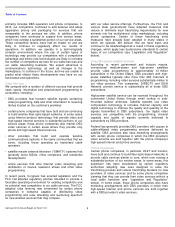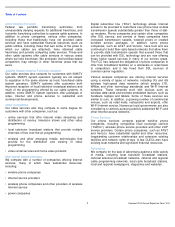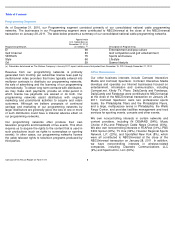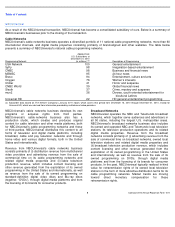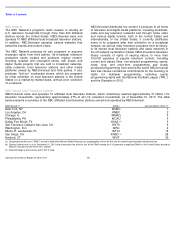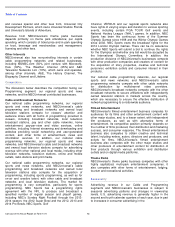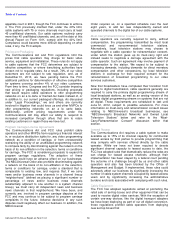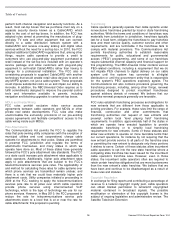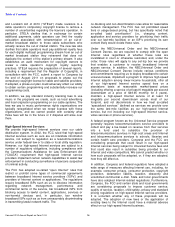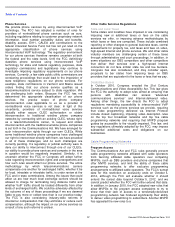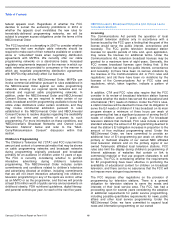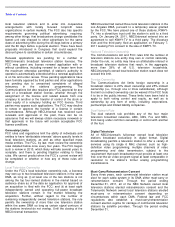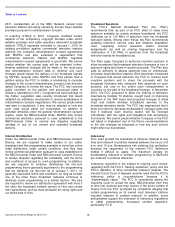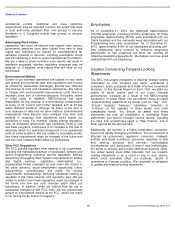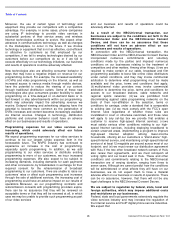Comcast 2010 Annual Report Download - page 20
Download and view the complete annual report
Please find page 20 of the 2010 Comcast annual report below. You can navigate through the pages in the report by either clicking on the pages listed below, or by using the keyword search tool below to find specific information within the annual report.
Table of Contents
Comcast 2010 Annual Report on Form 10-K
16
and Localism Act of 2010 (“STELA”) made revisions to a
cable operator’s compulsory copyright license to remove a
number of uncertainties regarding the license’s operation. In
particular, STELA clarifies that, in exchange for certain
additional payments, cable operators can limit the royalty
calculation associated with retransmission of an out-of-
market broadcast station to those cable subscribers who
actually receive the out-of market station. The new law also
clarifies that cable operators must pay additional royalty fees
for each digital multicast programming stream from an out-of
market broadcast station they retransmit that does not
duplicate the content of the station’s primary stream. It also
establishes an audit mechanism for copyright owners to
review a cable operator’s copyright royalty reporting
practices. STELA requires the preparation of several reports,
including a requirement that the Register of Copyrights, in
consultation with the FCC, submit a report to Congress by
the end of August 2011 on proposals to phase out the
compulsory copyright license for cable and satellite providers.
If adopted, a phase-out plan could adversely affect our ability
to obtain certain programming and substantially increase our
programming costs.
In addition, we pay standard industry licensing fees to use
music in the programs we create, such as local advertising
and local origination programming on our cable systems. The
fees we pay to music performance rights organizations are
typically renegotiated when we renew licenses with those
organizations, and we cannot predict with certainty what
those fees will be in the future or if disputes will arise over
them.
High-Speed Internet Services
We provide high-speed Internet services over our cable
distribution system. In 2002, the FCC ruled that high-speed
Internet services such as ours are an interstate information
service, not subject to regulation as a telecommunications
service under federal law or to state or local utility regulation.
However, our high-speed Internet services are subject to a
number of regulatory obligations, including compliance with
the Communications Assistance for Law Enforcement Act
(“CALEA”) requirement that high-speed Internet service
providers implement certain network capabilities to assist law
enforcement in conducting surveillance of persons suspected
of criminal activity.
The FCC has adopted so-called “open Internet” rules that
restrict or prohibit some types of commercial agreements
between broadband Internet service providers (“ISPs”) and
providers of Internet content or applications. The regulations
require broadband ISPs such as us to disclose information
regarding network management, performance and
commercial terms of the service, bar broadband ISPs from
blocking access to lawful content, applications, services or
non-harmful devices and, in particular, bar wireline
broadband ISPs such as us from unreasonably discriminating
in transmitting lawful network traffic. The
no-blocking and non-discrimination rules allow for reasonable
network management. The FCC has not prohibited speed
tiers or usage-based pricing, but has specifically noted that
so-called “paid prioritization” (i.e., charging content,
application and service providers for prioritizing their traffic
over our last-mile facilities) or an ISP’s prioritizing its own
content likely would violate these rules.
Under the NBCUniversal Order and the NBCUniversal
Consent Decree, we are required to comply with the open
Internet rules regardless of whether these rules are
invalidated in court or otherwise rescinded, and, under the
order, those rules will apply to any set-top box we provide
that enables a customer to receive broadband Internet
access service. In addition, the NBCUniversal Order and
NBCUniversal Consent Decree include various conditions
and commitments requiring us to deploy broadband to certain
unserved areas, implement a program to improve high-speed
Internet adoption among lower-income households, offer all
of our high-speed Internet service speed tiers on a
standalone basis at reasonable market-based prices
(including offering a service of at least 6 megabits per second
downstream at a price of $49.95 monthly for 3 years),
maintain a high-speed Internet service of at least 12
megabits per second downstream across most of our
footprint, and not discriminate in how we treat so-called
“specialized services” (defined as services we provide over
the same last-mile facilities as our high-speed Internet
service, but not including our high-speed Internet service,
video services or phone services).
A federal program known as the Universal Service program
generally requires telecommunications service providers to
collect and pay a fee based on revenue from their services
into a fund used to subsidize the provision of
telecommunications services in high-cost areas and Internet
and telecommunications services to schools, libraries and
certain health care providers. Congress and the FCC are
considering proposals that could result in our high-speed
Internet services being subject to Universal Service fees and
that could also result in subsidies being provided to our
Internet and video competitors. We cannot predict whether or
how such proposals will be adopted, or, if they are adopted,
how they will affect us.
In addition, Congress and federal regulators have adopted a
wide range of measures affecting Internet use, including, for
example, consumer privacy, consumer protection, copyright
protection, defamation liability, taxation, obscenity and
unsolicited commercial e-mail. State and local governments
have also adopted Internet-related regulations. Furthermore,
Congress, the FCC and certain state and local governments
are considering proposals to impose customer service,
quality of service, taxation, child safety, privacy and standard
pricing regulations on high-speed Internet service providers.
It is uncertain whether any of these proposals will be
adopted. The adoption of new laws or the application of
existing laws to the Internet could have a material adverse
effect on our high-speed Internet business.


